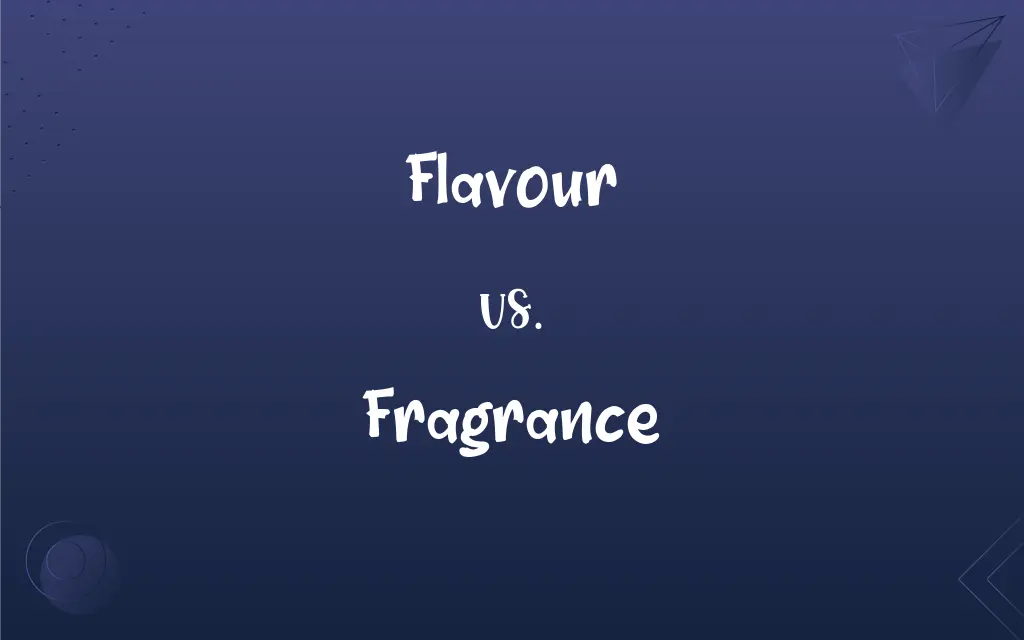Flavour vs. Fragrance: What's the Difference?
Edited by Aimie Carlson || By Harlon Moss || Published on December 10, 2023
Flavour is the sensory impression of food or other substances on the taste buds, while fragrance is the pleasant or sweet smell emitted by substances.

Key Differences
Flavour is a combination of taste and smell perceived when eating or drinking, influenced by ingredients, preparation, and freshness. Fragrance, on the other hand, refers exclusively to the aromatic experience, often associated with perfumes, flowers, and scented products.
Flavour is crucial in food and beverage industries, determining the appeal and identity of culinary products. Fragrance plays a significant role in products like perfumes, candles, and personal care items, contributing to their sensory appeal.
Flavour involves both gustatory (taste) and olfactory (smell) components, while fragrance is solely an olfactory experience, not involving the sense of taste.
The science of flavour encompasses a range of disciplines, from chemistry to psychology, focusing on how substances interact with taste receptors. In contrast, the study of fragrance often involves the art of perfumery and the chemistry of volatile compounds that evoke a sense of smell.
Flavour can be natural or artificially created to enhance or modify the taste of food and beverages. Fragrance, similarly, can be derived from natural sources or synthesized to create a wide array of scents for various uses.
ADVERTISEMENT
Comparison Chart
Definition
Sensory impression of food or substances on taste buds
Pleasant or sweet smell emitted by substances
Primary Sense
Involves both taste and smell
Involves only the sense of smell
Industry Use
Important in food and beverage industries
Used in perfumes, candles, personal care
Component
Combination of taste, aroma, and mouthfeel
Solely aromatic
Creation
Can be natural or artificially enhanced
Can be derived from natural sources or synthesized
ADVERTISEMENT
Flavour and Fragrance Definitions
Flavour
The distinct taste of food or drink.
The flavour of fresh strawberries is sweet and slightly tangy.
Fragrance
The aroma or scent of something, especially when pleasant.
The fragrance of freshly baked bread is irresistible.
Flavour
An artificial or natural taste added to food.
Vanilla flavour is often added to enhance desserts.
Fragrance
The quality of being fragrant.
The fragrance of the pine forest was refreshing.
Flavour
A combination of taste and aroma.
The rich flavour of chocolate is both bitter and fragrant.
Fragrance
A pleasant, sweet smell.
The fragrance of roses filled the garden.
Flavour
The characteristic taste of a particular substance.
The flavour of garlic is strong and pungent.
Fragrance
A distinctive, often pleasant smell.
The fragrance of lavender is known for its calming properties.
Flavour
The overall sensory impression of a food item.
The flavour of this soup combines spicy, salty, and umami notes.
Fragrance
A substance designed to emit a pleasant odor.
She wore a fragrance with notes of jasmine and sandalwood.
Flavour
Variant of flavor.
Fragrance
The quality of having a pleasant odor
The fragrance of the ocean breeze.
Flavour
Standard spelling of flavor#Noun
The flavour of this apple pie is delicious.
Flavour was added to the pudding.
What flavour of bubble gum do you enjoy?
The flavour of an experience.
Debian is one flavour of the Linux operating system.
Fragrance
A sweet or pleasant odor; a scent.
Flavour
Standard spelling of flavor#Verb
Fragrance
A substance, such as a perfume or cologne, designed to emit a pleasant odor.
Flavour
The general atmosphere of a place or situation and the effect that it has on people;
The feel of the city excited him
A clergyman improved the tone of the meeting
It had the smell of treason
Fragrance
A pleasant smell or odour.
Flavour
(physics) the kinds of quarks and antiquarks
Fragrance
(transitive) To apply a fragrance to; to perfume.
Flavour
The taste experience when a savoury condiment is taken into the mouth
Fragrance
The quality of being fragrant; sweetness of smell; a sweet smell; a pleasing odor; perfume.
Eve separate he spies,Veiled in a cloud of fragrance.
The goblet crowned,Breathed aromatic fragrancies around.
Flavour
Lend flavor to;
Season the chicken breast after roasting it
Fragrance
A distinctive odor that is pleasant
Fragrance
A pleasingly sweet olfactory property
FAQs
What is flavour primarily associated with?
Flavour is primarily associated with the sensory experience of eating and drinking.
How do flavour enhancers work?
Flavour enhancers work by amplifying the taste and aroma of food.
What role do essential oils play in fragrance?
Essential oils are often used as key components in creating fragrances.
Can fragrances have therapeutic effects?
Yes, certain fragrances, like lavender, are known for their therapeutic effects.
What is the main aspect of fragrance?
Fragrance is mainly concerned with the sense of smell.
Do cultural factors influence flavour preferences?
Yes, cultural factors significantly influence flavour preferences and perceptions.
Can flavour exist without aroma?
No, flavour is a combination of taste and aroma.
Is fragrance only found in perfumes?
No, fragrance can be found in a variety of products, including candles, personal care items, and nature.
Can people have a preference for certain flavours?
Yes, individual preferences for certain flavours are common.
What is the difference between fragrance and odor?
Fragrance generally refers to pleasant scents, while odor can refer to any smell, pleasant or unpleasant.
Can flavours change over time?
Yes, flavours can change over time due to factors like aging and exposure to air.
How do natural and synthetic fragrances differ?
Natural fragrances are derived from plants and other natural sources, while synthetic fragrances are chemically created.
Are there health benefits associated with certain flavours?
Some flavours, particularly those from natural spices and herbs, can have health benefits.
What is a fragrance note?
A fragrance note refers to a specific scent or set of scents that can be perceived in a fragrance composition.
Is fragrance important in marketing?
Yes, fragrance is an important aspect of marketing, especially in personal care and home products.
Are synthetic fragrances safe?
Synthetic fragrances are generally safe but can cause allergies in some people.
What factors contribute to the complexity of a flavour?
Ingredients, preparation methods, and freshness contribute to the complexity of a flavour.
Can fragrances be customized?
Yes, fragrances can be customized to create unique scent profiles.
Can flavour be influenced by temperature?
Yes, the temperature at which food is served can influence its flavour.
How does aging affect flavour?
Aging can enhance or alter the flavour of certain foods and drinks, like wine and cheese.
About Author
Written by
Harlon MossHarlon is a seasoned quality moderator and accomplished content writer for Difference Wiki. An alumnus of the prestigious University of California, he earned his degree in Computer Science. Leveraging his academic background, Harlon brings a meticulous and informed perspective to his work, ensuring content accuracy and excellence.
Edited by
Aimie CarlsonAimie Carlson, holding a master's degree in English literature, is a fervent English language enthusiast. She lends her writing talents to Difference Wiki, a prominent website that specializes in comparisons, offering readers insightful analyses that both captivate and inform.






































































